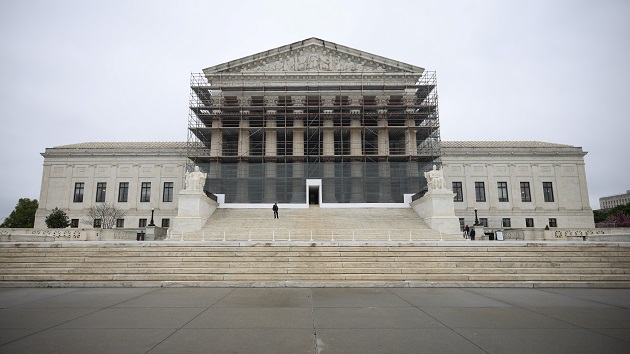
(WASHINGTON) — The Supreme Court on Thursday, in a rare deadlocked 4-4 ruling, said Oklahoma cannot create the nation’s first religious charter school funded directly with taxpayer dollars.
Justice Amy Coney Barrett, a Catholic, did not take part in the decision, recusing from the case early on, presumably given her ties to the Notre Dame Law School clinic that supported the Catholic archdiocese’s effort to create the school, but she did not explain her decision.
The Supreme Court issued a one-line opinion upholding the Oklahoma Supreme Court’s ruling that taxpayer-funded religious schools would violate both the state and U.S. constitutions.
“The judgment is affirmed by an equally divided Court,” the Supreme Court wrote in an unsigned ruling, so it is not known how each justice voted on the issue.
The court action leaves in place lower court rulings that said the arrangement would have violated the establishment clause of the First Amendment.
The decision is a setback for a religious freedom movement that has notched major gains in recent years under the Supreme Court’s current conservative majority, including rulings allowing the use of taxpayer-funded school vouchers, scholarships, and capital improvement grants by religious organizations.
First Liberty, a major religious right advocacy group behind faith-based cases at the high court, represented the Oklahoma state school superintendent, Ryan Walters, who was pushing for religious charters.
Walters vowed to keep fighting for them.
“Allowing the exclusion of religious schools from our charter school program in the name of 19th century religious bigotry is wrong,” said Walters. “As state superintendent, I will always stand with parents and families in opposition to religious discrimination and fight until all children in Oklahoma are free to choose the school that serves them best, religious or otherwise.”
The Supreme Court ruling is almost certainly not the final word on the issue, however.
Because the high court divided evenly, its decision is not a binding precedent nationwide and sets the stage for the entire court to reconsider the issue in a future case, perhaps from another state.
The decision is being greeted with relief by advocates for public schools and independent charter schools, who feared that a ruling in favor of St. Isidore of Seville, the Oklahoma Catholic school, would create major disruptions to education systems nationwide.
Forty-five states have charter school programs, encompassing 8,000 schools that serve 3.8 million kids.
Some states, opposed to funding of religious charter schools, had warned they may be forced to curtail their charter programs or end them entirely.
The American Federation of Teachers, which filed an amicus brief in the two related cases before the court, celebrated the court’s block of taxpayer-funded religious charter schools.
“Today, the court let the decision of the Oklahoma Supreme Court stand, which correctly upheld the separation of church and state and backed the founders’ intention to place religious pluralism over sectarianism,” AFT President Randi Weingarten said. “We are pleased that four of the justices agreed that we must preserve and nurture the roots of our democracy, not tear up its very foundations.”
“We respect and honor religious education. It should be separate from public schooling,” Weingarten added. “Public schools, including public charter schools, are funded by taxpayer dollars because they are dedicated to helping all—not just some—children have a shot at success. They are the bedrock of our democracy, and states have long worked to ensure that they remain secular, open and accessible to all.”
ABC News’ Alexandra Hutzler contributed to this report.
Copyright © 2025, ABC Audio. All rights reserved.
